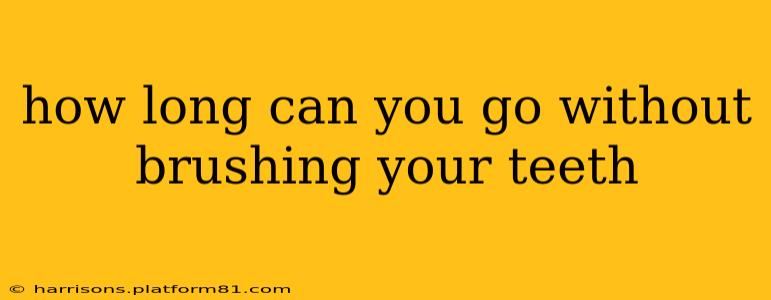Maintaining good oral hygiene is crucial for overall health. But how long can you realistically go without brushing your teeth before experiencing negative consequences? The answer isn't a simple number of days, but rather a complex interplay of individual factors and potential risks. This article explores the timeline of neglecting oral hygiene and answers common questions surrounding this topic.
What Happens When You Don't Brush Your Teeth?
The moment you skip brushing, bacteria in your mouth begin to feast on leftover food particles. This leads to a cascade of events:
- Plaque Buildup: Within hours, a sticky film called plaque forms on your teeth. Plaque is a breeding ground for bacteria that produce acids. These acids attack tooth enamel, the protective outer layer of your teeth.
- Bad Breath (Halitosis): The bacteria responsible for plaque also produce volatile sulfur compounds, leading to bad breath. This is often one of the first noticeable signs of poor oral hygiene.
- Gingivitis: As plaque accumulates, it irritates the gums, causing gingivitis. This is characterized by red, swollen, and bleeding gums. If left untreated, gingivitis can progress to periodontitis.
- Cavities (Dental Caries): The acids produced by bacteria in plaque erode tooth enamel, eventually leading to cavities. Cavities are holes in the teeth that require professional dental treatment.
- Periodontitis: If gingivitis is left untreated, it can progress to periodontitis, a severe gum infection that damages the soft tissues and bone supporting your teeth. Periodontitis can lead to tooth loss.
- Increased Risk of Systemic Diseases: Emerging research suggests a link between poor oral hygiene and an increased risk of serious health problems, such as heart disease, stroke, and diabetes.
How Long Before Problems Arise?
There's no magic number of days before problems inevitably occur. The timeline depends on several factors:
- Your Diet: A diet high in sugary and starchy foods provides more fuel for bacteria, accelerating plaque buildup and acid production.
- Your Saliva: Saliva plays a crucial role in neutralizing acids and washing away food particles. Individuals with dry mouth are at higher risk of developing dental problems more quickly.
- Your Genetics: Some individuals are genetically predisposed to gum disease or cavities.
- Existing Oral Health Conditions: If you already have gum disease or cavities, neglecting brushing will worsen these conditions rapidly.
While some individuals might see visible signs of plaque and gingivitis within a few days, others might take longer to develop noticeable symptoms. However, the damage starts accumulating from the moment you skip brushing. The longer you neglect your teeth, the greater the risk of severe and irreversible problems.
What About "Natural Cleaning"? Does Saliva Clean Teeth Enough?
Saliva does help to naturally cleanse the mouth, but it is not enough to combat the bacteria and food particles that contribute to plaque buildup and cavities. Relying solely on saliva is insufficient for maintaining optimal oral health.
How Often Should I Brush My Teeth?
Dental professionals recommend brushing your teeth twice a day, for at least two minutes each time, using fluoride toothpaste. This helps remove plaque and prevent the buildup of bacteria.
Can I Use Mouthwash Instead of Brushing?
Mouthwash can be a helpful addition to your oral hygiene routine, but it should not replace brushing and flossing. Mouthwash helps to kill bacteria and freshen breath, but it cannot effectively remove plaque from the tooth surfaces.
What if I'm Traveling and Don't Have My Toothbrush?
If you're traveling and don't have your toothbrush, try to find a way to brush your teeth as soon as possible. Rinsing your mouth thoroughly with water after meals can help to remove some food particles. However, this is not a long-term solution.
In conclusion, while there's no set number of days before serious problems occur from neglecting to brush your teeth, the longer you wait, the greater the risk of irreversible damage to your teeth and gums. Prioritizing good oral hygiene through regular brushing, flossing, and dental checkups is essential for maintaining your overall health and well-being.
